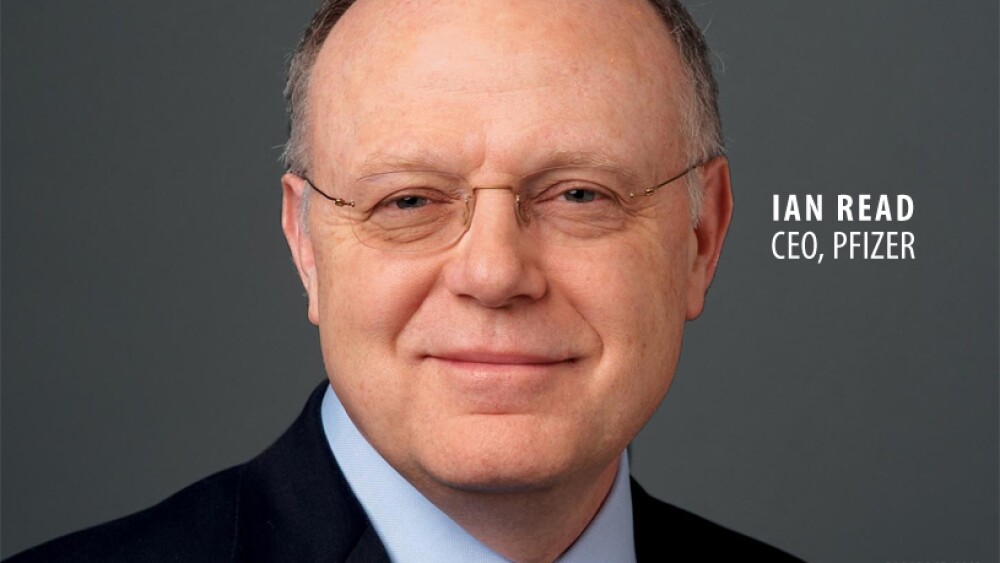February 2, 2017
By Mark Terry, BioSpace.com Breaking News Staff
Pfizer ’s fourth-quarter report hit revenue expectations, but missed on its consensus earnings estimate. It reported $13.63 billion for the fourth quarter and $0.50 earnings per share, with its adjusted diluted EPS $0.47. There was plenty of other information, including three pipeline programs the company quietly killed.
Keith Speights, writing for The Motley Fool, discusses five important topics Pfizer executives brought up at the earnings conference call.
1. Tax Reform
Pfizer’s chief executive officer, Ian Read, didn’t attend President Trump’s meeting with biopharma executives, choosing instead to participate in his company’s conference call. However, one of Trump’s proposed policies—a change in the corporate tax—was a topic of discussion.
Read claimed that if the GOP/Trump tax proposals were implemented as they say, it would let Pfizer create more U.S. jobs. He noted that the GOP tax proposals “are overall favorable for the pharmaceutical industry.”
He also said he approved of the possibility of streamlining regulations with the U.S. Food and Drug Administration (FDA). If so, he may be an outlier. STAT surveyed several biopharma leaders, most of whom thought Trump’s proposals for the FDA were a solution in need of a problem.
“My general perspective is that industry is overall been happy with the pace” of FDA approvals, Darshan Kulkarni, an attorney focused on FDA law, told STAT. “I think there’s be more, for lack of a better term, quacks coming onto the market if there were less regulation.”
2. Obamacare Repeal and Replace
Read noted that the industry hadn’t benefited from the Affordable Care Act (ACT), and that the level of insurance that the new 20 million insured received didn’t provide much access to innovative drugs.
Otherwise, Speights writes, “Read didn’t seem too concerned about another one of Trump’s healthcare priorities: bringing down prescription drug prices. He expressed support for value-based pricing and potential regulatory changes that would put patients’ percentage of out-of-pocket spending for drugs on an equal footing with the out-of-pocket percentage of hospital stays.”
3. Current Product Concerns
Pfizer’s group president of Innovative Health, Albert Bourla, discussed some of the challenges the company was facing for some of its drugs. Prevnar 13, a pneumococcal conjugate vaccine, had been administered to about half of the U.S. population 65 years or older, and that it planned to target the rest in the age group as well as everyone else in the country between ages 19 and 64.
Its prostate cancer drug, Xtandi, had sales drop in the fourth quarter compared to the previous year’s fourth quarter, even though prescription volumes increased. Speights writes, “He cited increased contributions to assistance programs as a key factor behind these results.”
And Bourla was happy about Ibrance, noting that he believed the drug had a 45 percent market share in the fourth quarter for breast cancer patients’ first-line treatment of ER-positive and HER2-negative breast cancer, and a 40 percent share as a second-line treatment.
4. Pipeline
The company’s president of worldwide research and development, Mikael Dolsten, predicted five drug approvals in both 2017 and 2018. Speights writes, “Pfizer’s PD-L1 inhibitor avelumab stands out as one of the most exciting pipeline prospects. The company especially sees opportunities for the immune-oncology drug in combination with other therapies. An FDA decision on potential approval for avelumb in treating metastatic Merkel cell carcinoma is expected this year.”
The company also hopes it can expand its indications for Xeljanz this year. It’s approved in the US for rheumatoid arthritis (RA), and hopes for approval this year in Europe. It also plans to file with the FDA for treating ulcerative colitis and psoriatic arthritis in the next five months.
5. M&A
In 2016, Pfizer bought Anacor Pharmaceuticals and Medivation . Some of the company’s plans seem to hinge on Trump’s tax proposals happening. Read said, “We’re going to continue to do [business development] where we see value for our shareholders. And we think we have flexibility and the balance sheet to do that. And so I don’t see a dramatic pause.”
The dramatic pause refers to whether the company would wait for Trump’s tax deals to be implemented. And the answer seems to be no. Which hints that Pfizer might buy somebody this year.





